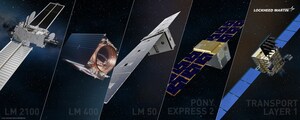FORTIS Demonstrates Productivity and Safety Improvements at U.S. Navy Shipyard
NCMS Report Says Exoskeletons Prevent Injury
ORLANDO, Fla., Feb. 23, 2017 /PRNewswire/ -- The National Center for Manufacturing Sciences (NCMS) has concluded that industrial exoskeletons, including Lockheed Martin's (NYSE: LMT) FORTIS, improve industrial productivity and prevent work injuries. The findings are included in the final report Industrial Human Augmentation Systems (iHAS) for Improved Shipyard Operations released to Lockheed Martin.
Summarizing tests at a U.S. Navy shipyard, the NCMS report found that the FORTIS exoskeleton could mitigate nearly all injuries from power tools by making the tools effectively weightless during operation. Additional benefits included increased productivity and quality improvements. The report noted that shipyard work is hazardous, with a high rate of injury in the United States.
"It is significant that in both tasks where the exoskeleton was used, the amount of work accomplished and time-on-task increased. We received valuable feedback from the study, and it's clear that FORTIS can prevent accidental and long-term injuries while allowing workers to be more productive," said Glenn Kuller, Advanced and Special Programs vice president at Lockheed Martin Missiles and Fire Control. "That's a double-win, for both workers and employers."
To support the test and evaluation efforts, Lockheed Martin provided FORTIS units on loan to two naval shipyards. Testing and evaluation measured worker productivity, work quality and ergonomic considerations. Feedback was overwhelmingly positive, with participants expressing a desire to use the exoskeleton in their regular work. The study proved that using human augmentation to accomplish shipyard tasks involving heavy tools can improve productivity while mitigating a significant cause of worker injury.
The FORTIS exoskeleton is an unpowered, lightweight exoskeleton that increases an operator's strength and endurance by transferring the weight of heavy loads from the operator's body directly to the ground through a series of joints at the hips, knees and ankles. Originating from Lockheed Martin's exoskeleton research to assist soldiers in carrying heavy equipment over long distances, the same principles were applied to exoskeleton development for use in industrial settings.
For additional information, visit our website: http://www.lockheedmartin.com/us/products/exoskeleton/industrial.html
About Lockheed Martin
Headquartered in Bethesda, Maryland, Lockheed Martin is a global security and aerospace company that employs approximately 97,000 people worldwide and is principally engaged in the research, design, development, manufacture, integration and sustainment of advanced technology systems, products and services.
SOURCE Lockheed Martin
Related Links
WANT YOUR COMPANY'S NEWS FEATURED ON PRNEWSWIRE.COM?
Newsrooms &
Influencers
Digital Media
Outlets
Journalists
Opted In




Share this article